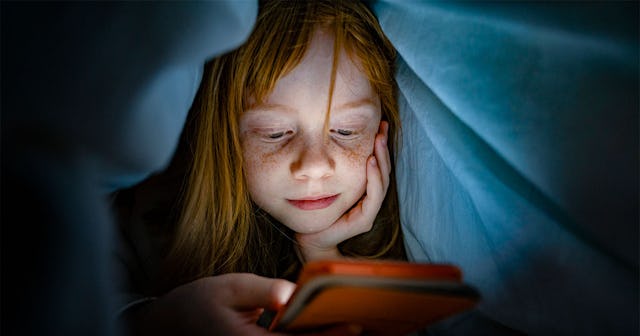How Young Is Too Young For Social Media?

Think back to when you were a teenager. Could your brain have ever even imagined what our world would be like today? We forty-somethings were counting our AOL minutes and sending IMs. When we met a kid at camp during the summer, we hoped that maybe we could be pen pals. We knew nothing about adding them as a “friend” on social media to stay connected. Never in a million years could we even comprehend something like that back then! Yet today, social media is as much a part of our daily life as getting dressed and brushing our teeth. But at what age does that all begin?
My 13-year-old son recently begged me to let him have a Snapchat account. Technically he is old enough to have Snapchat, but is he ready? This being his first foray into social media, I was more than hesitant. I myself don’t have Snapchat, so I am not savvy as to how it works. After consulting with some mom friends about the ins and outs, and talking with my husband, we decided to trust him and allow him to join. I am actively monitoring what he is doing, that is before it disappears, and so far, so good. He is my oldest with three siblings, one brother just two years behind. I am waiting for the moans of unfairness to begin. But when they do, he’s out of luck. Eleven is just too young for social media, and the experts agree with me.
Researchers have long been trying to nail down what exactly is the most appropriate age for kids to begin using social media. The newest data is showing that social media before age 11 is a no-no. It’s not good for kids’ brains or their behaviors.
Computers in Human Behavior recently published research that parents may want to see. A study of more than 750 middle schoolers in the Northeastern United States found many issues with students who joined when there were below the age of 10. First, it was found that the students had more Internet friends and acquaintances than their parents approved as young joiners. They also spent extended time visiting websites that were not on an approved list. Most interestingly, they showed, “unsympathetic online behaviors.” They were also, unfortunately, more likely to be bullied or harassed online.
Just like Snapchat, social media giants like Instagram, Facebook, and TikTok all require that their users be at least 13 years old to sign up. But we all know how easy it is to fake that information and make ourselves any age that we want to be.
“Social media sites all require a minimum age of 13 to register, but the reality is that many users are younger than that: one-third of our sample had already started using social media at age 11 or 12 and another one-third had begun at age 10 or younger,” said the study’s lead author Linda Charmaraman, Ph.D., director of the Youth, Media and Wellbeing Research Lab at the Wellesley Centers for Women (WCW). “This study helps us understand the risks and benefits for kids and tweens, so that parents and policymakers can make decisions that prioritize their wellbeing.”
There were positive findings among the research. As a matter of fact, there were several things that the research found that was good news. First, no matter their age, kids on social media tended to engage in positive behaviors more often than negative. It was also found that those who joined at an earlier age also seemed to find an interest in socially supportive posts and helping to bring awareness to causes and injustices more often than those who joined a bit older. It is believed that this is because those adolescents are being socialized online at a younger age and are able to understand the positive and negative aspects of the different social media platforms.
“These findings suggest that the industry-based age minimum of 13 for social media users may potentially be a good standard, if it can be enforced,” said Charmaraman. “The findings also suggest that a potential strategy to support families with children, tweens, and teens is to a) keep track of social media sites joined and online friend networks; b) set even one rule about screen use (i.e., limiting duration on school nights); and c) monitor children’s frequency of checking, particularly if they’re using social media at age 10 and younger.”
So what does it mean? Hold out. Kids will be kids and the younger and less mature that they are, the more trouble they can find themselves getting into. We all know the grave dangers that come along with having an online presence. Therefore, when the time comes, it is of the utmost importance that parents continually remind their children to be safe online. Even if they are not online yet, it is never too soon to start that conversation.
This article was originally published on